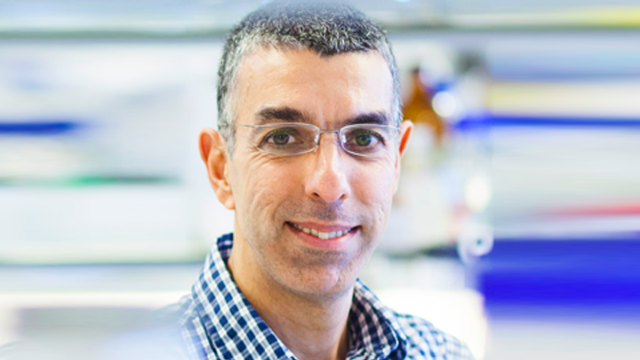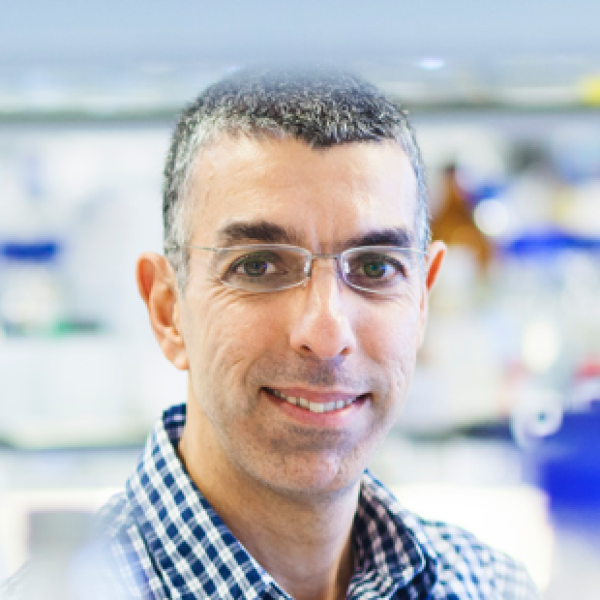
Our Focus
By developing innovative genomic, genetic, and proteomics tools, we set to identify novel cellular vulnerabilities that can be exploited for cancer (immune) therapies. In recent years, we have made major discoveries in mRNA translation in cancer, particularly in the context of amino acid availability to the tumour. We demonstrated that despite restrictive amino acid availability, protein production is maintained in the cancer cells, albeit with a high frequency of specific mistakes. We coined this phenomenon “Sloppiness” and showed that its outcome is the production of aberrant proteins and the presentation of neo-epitopes at the surface of cancer cells. These neoepitopes can serve as targets for immunotherapy. Currently, we use genetic tools to underpin genetic drivers of Sloppiness and employ immunological tools to utilize this knowledge for novel therapeutic approaches.
About Reuven Agami
My Research
Reuven Agami started his research career as a PhD student working on the c-Abl kinase protein and apoptosis in the lab of Yosef Shaul at the Weizmann Institute of Science, Israel. In 1998 he moved to The Netherlands Cancer Institute, Amsterdam, as a postdoc fellow working on initiation and maintenance of DNA damage responses. In 2001 he began his own lab at the division of tumor biology at the Netherlands Cancer Institute working on stable inactivation of human genes by RNA interference as well as microRNAs. In 2008 he was chosen to become a division head of Gene regulation at the Netherlands Cancer Institute, Amsterdam. In 2009 he became professor at the department of Genetics, Erasmus medical center in Rotterdam. In 2014 he moved to head the division of Biological Stress Response at the Netherlands Cancer Institute, and since 2017 he is heading the division of Oncogenomics at the Netherlands Cancer Institute.
Major breakthroughs of Reuven Agami were the discovery of c-Abl/p73 interaction and its role in cell cycle arrest and apoptosis during his PhD, the role of cyclin D1 degradation following DNA damage during his Postdoc, as well as the development of pSUPER, the first RNAi vector for stable suppression of gene expression in mammalian cells, and the establishment of cancerous roles of numerous microRNAs and RNA binding proteins using novel genetic screening approaches as a young group leader. As a more senior investigator he contributed to understanding the role of alternative cleavage and polyadenylation of mRNAs (APA) in human disease, the functional role of regulatory DNA elements in cancer, the connection between transcription and translation, and finally the identification and utilization of amino acid shortages in cancer.
Awards
2016: Awarded ZonMW-TOP grant project on enhancers in breast and prostate cancer
2013: Awarded ERC advanced project on enhancer RNAs.
2011: VICI grant award, ZonMW website.
2010: ESCI Award Winner 2010, Basic/Translational Research ESCI website.
2009: Professor at the Genetics and Pathology departments of Erasmus Medical Center, Rotterdam
2008: Awarded ERC starting project on microRNA regulation
2008: Elected member of the central for biomedical genetics (CBG)
2008: Elected member of EMBO
2007: Awarded The Dr. Joseph Steiner Prize, Switzerland
2007 in Biel. 2006: Elected member of the young academy (DJA-KNAW).
2004: EMBO young investigator award.
2004: VIDI grant.
2004: European Young Investigator Award (EURYI).
2002: Elected fellow of the central for biomedical genetics (CBG).
2001: Netherlands Cancer Institute (AVL) award. 1999: EMBO long-term fellowship.
Key Publications
Brummelkamp, T. R., Bernards, R., & Agami, R. (2002). A system for stable expression of short interfering RNAs in mammalian cells. Science, 296(5567), 550-553.
Jenal, M., Elkon, R., Loayza-Puch, F., van Haaften, G., Kühn, U., Menzies, F. M., ... & Rubinsztein, D. C. (2012). The poly (A)-binding protein nuclear 1 suppresses alternative cleavage and polyadenylation sites. Cell, 149(3), 538-553.
Kedde, M., Strasser, M. J., Boldajipour, B., Vrielink, J. A. O., Slanchev, K., le Sage, C., ... & Lund, A. H. (2007). RNA-binding protein Dnd1 inhibits microRNA access to target mRNA. Cell, 131(7), 1273-1286.
Korkmaz, G., Lopes, R., Ugalde, A. P., Nevedomskaya, E., Han, R., Myacheva, K., ... & Agami, R. (2016). Functional genetic screens for enhancer elements in the human genome using CRISPR-Cas9. Nature biotechnology, 34(2), 192.
Loayza-Puch, F., Rooijers, K., Buil, L. C., Zijlstra, J., Vrielink, J. F. O., Lopes, R., ... & van Tellingen, O. (2016). Tumour-specific proline vulnerability uncovered by differential ribosome codon reading. Nature, 530(7591), 490.
Slobodin, B., Han, R., Calderone, V., Vrielink, J. A. O., Loayza-Puch, F., Elkon, R., & Agami, R. (2017). Transcription impacts the efficiency of mRNA translation via co-transcriptional N6-adenosine methylation. Cell, 169(2), 326-337.
Voorhoeve, P. M., Le Sage, C., Schrier, M., Gillis, A. J., Stoop, H., Nagel, R., ... & Zlotorynski, E. (2006). A genetic screen implicates miRNA-372 and miRNA-373 as oncogenes in testicular germ cell tumors. Cell, 124(6), 1169-1181.
Members
| Reuven Agami Group leader | Adva Kochavi Phd student | Amos Fumagalli PhD |
| Chao Yang Post Doc | Daniela Annibali Senior PostDoc | Demi Wernaart Phd student |
| Domenica Lovecchio Phd Student | Jasmine Montenegro Navarro Research Analyst | Julien Champagne Postdoc fellow |
| Kelly Mordente Phd Student | Lorenzo Valcanover PhD | Miha Sovrovic Phd student |
| Mrittika Adhikary PhD | Peng Chai MSc | Pierre-René Körner PhD student |
| Remco Nagel Postdoc fellow | Yuval Malka Postdoc fellow |
